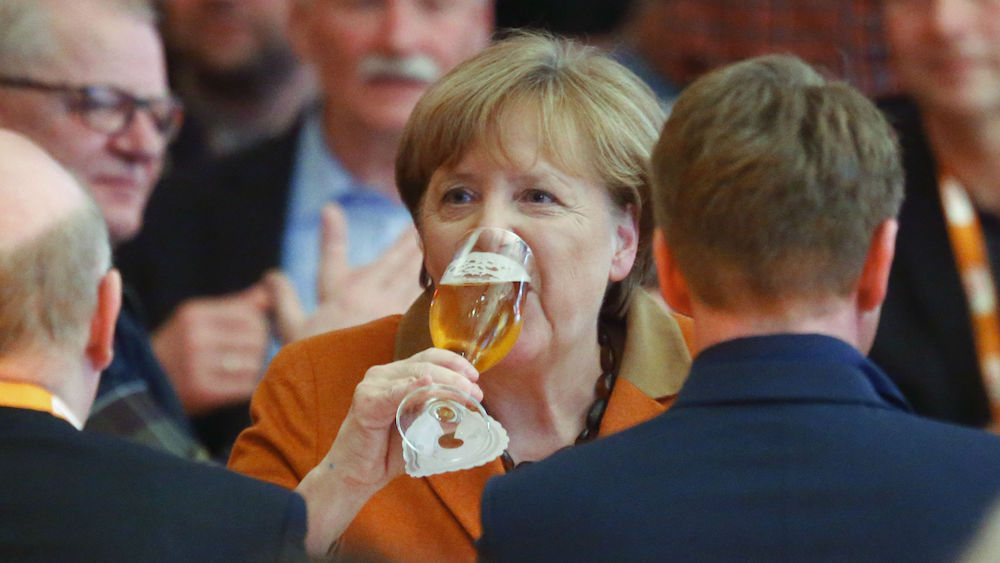Just before the start of Lent, political parties in Germany used to get together at beer-fueled meetings to roast each other on Ash Wednesday. In today’s sober times, however, Chancellor Angela Merkel may prove to be a lone natural.
When Germany’s former foreign minister Joschka Fischer departed the political stage in 2005, he had nothing but scorn for his heirs. Fischer, a man with a notoriously strong sense of self, proclaimed himself the last of the live rock-and-roll generation in politics. “After me,” he said, “it’s all playback.”
His vainglorious valedictory remark came back to me last week as I watched Germany’s leaders go through the motions on Ash Wednesday. The first day of Lent is when politicians here are supposed to loosen Germany’s stiff political corset and, for an hour or two, give their opponents a humorous roasting.
That is the tradition, at least. Once, a politician joked about a rival so unpopular that, if he became an undertaker, people would stop dying in protest.
Such lowbrow humor is a distant memory today. As an Anglo-Saxon observer, political Ash Wednesday, indeed the entire pre-Lenten carnival season in Germany, reminds me of why outsiders call this country the land that jokes forgot.
Public humor is a dangerous business here, my German friends tell me, because humor is a very regional matter. If that’s the case, too many German regions are starving in terms of humor.
If Germany is part of the problem, the other part is the times we live in. Today, every word a politician utters can be retweeted instantly, stripped of its context and deconstructed by someone, somewhere, who is permanently poised to be upset on their own or someone else’s behalf. Why, politicians say, take that chance?
Then there’s the drinking. Political Ash Wednesday is a final excuse in Germany for pre-Lenten excess, disguised as a democratic gathering. Yet an outrageous number of politicians were on non-alcoholic drinks this year. Which leaves me with two questions: If you take the drink out of the tradition, what’s left? And in the brittle, buttoned-up world of German politics, am I seriously expected to get through to September’s federal elections sober?
Over the Moon
Of course Martin Schulz fans would argue that you don’t need drink to be inebriated and elated. The Social Democrats’ (SPD) rank and file is over the moon at how the former European Parliament president has shaken up German politics – and his party – by entering the election race.
One month and an eight-point opinion poll leap later, Schulz and his SPD have their best chance in twelve years of ousting Angela Merkel.
In the SPD’s Bavarian tent last week, drinkers cheered the core Schulz campaign promise: more fairness for the ordinary people who “keep the lights on” in Germany. Though still light on detail, he is promising careful corrections to the 2005 SPD social and economic reforms that, depending who you ask, either saved Germany or destroyed the SPD. (It may have done both.)
In the sober Merkel era, the Schulz euphoria is striking – and infectious. After years in the doldrums, the SPD’s relief at having a winner candidate is clear. But six months before polling day is very early to be peaking, and who’s to say the Schulz intoxication won’t lead to a murderous hangover?
At present, Schulz is a projection screen for the disparate, incompatible wishes of the SPD’s competing camps and electoral cleavages; he will eventually have to disappoint someone. Over in the tent of the Left Party, party co-leader Katja Kipping poked her finger in that very wound. Schulz’s reforms sounded “great,” she said, but could yet prove to be a mere “dash of powder on the same old neo-liberal face.”
Down the road, the Bavarian conservative CSU pulled in one thousand fewer drinkers than the SPD, despite being on home territory. For CSU leader Horst Seehofer, Ash Wednesday was about a quick bit of DIY papering over deep cracks on refugee policy with Chancellor Merkel.
And so it fell to Merkel, in her home constituency in the northeast, to deliver a fiery broadside against the Schulz challenge. She mocked the SPD’s self-analysis over the Agenda 2010 reforms, suggesting the Social Democrats were “always looking in the rear-view (mirror), never able to say they’re happy about something they achieved.”
“That’s why we as Christian Democrats say that we take care of the future, and others should preoccupy themselves with the past,” she shouted.
Under pressure in the polls over refugee and security matters, Merkel’s address was not just about tackling the Schulz challenge. It was about silencing doubts in her own party that she could switch from her preferred chancellor-manager mode back to election fighter. Job done, Merkel did something neither the CSU leader nor the SPD hopeful – a former alcoholic – did. While Schulz and Seehofer faked it with fizzy apple juice in traditional krugs, Merkel enjoyed a well-earned beer to soothe her hoarse voice.
And with that the German chancellor proved that – after twelve years as chancellor – she is no political playback singer. If she can learn to crack a few good jokes, who knows: In September, Angela Merkel might even have the last laugh.







